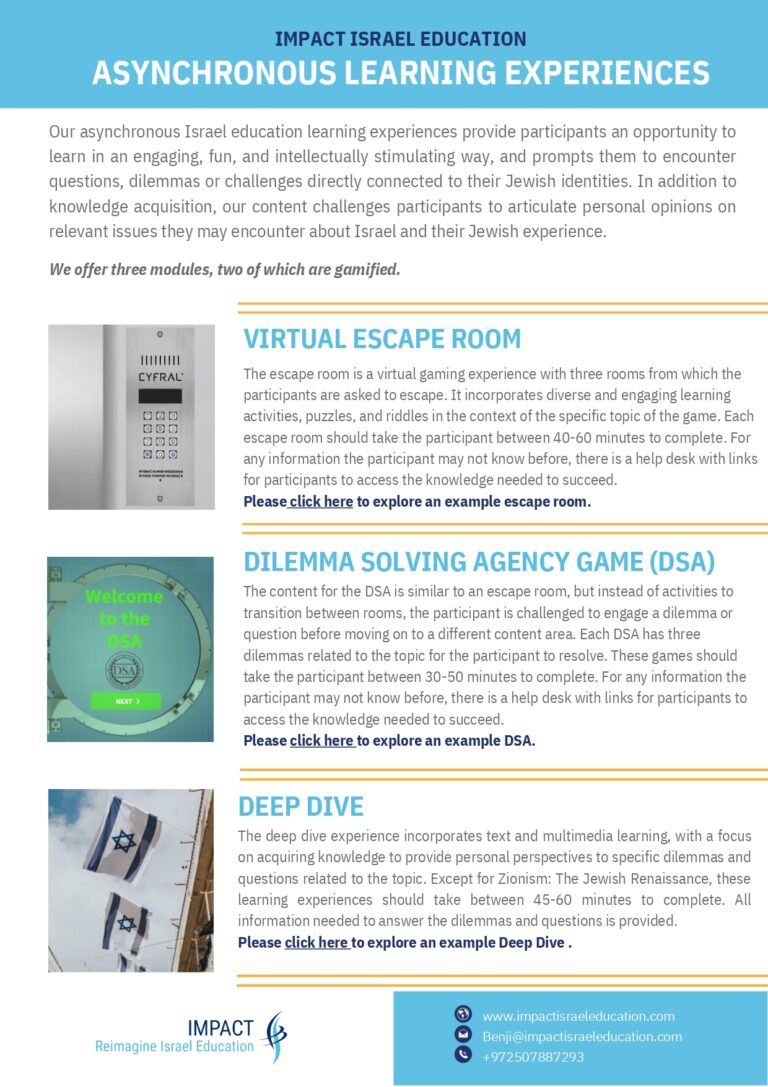The understanding modern Israel conception of Israel education aims to transmit the value of Zionism and collective belonging to the Jewish people through learning about contemporary Israeli history, politics, and society (Grinfas-David, 2012; Hassenfeld, 2016; 2018, Reingold, 2017; 2018; 2022; Stein, 2009; Stein, Grinfas-David, & Hartman, 2008; Zakai, 2018). Zionism in this context refers to the self-determination of the Jewish people to establish and maintain a nation-state in their ancestral homeland, which today is known as the modern state of Israel. This conception identifies Israel as the land and value of the Zionist movement which became the modern nation-state of the Jewish people. This conception of Israel education believes grappling with the history, politics, society of modern Israel, both its uniqueness and inspiration (Grinfas-David, 2012; Stein, 2009), as well as its “morally complex narratives” (Reingold, 2022, p. 53), will engender commitment to Israel for Jewish learners.
This conception aims for students to have a “compelling and germane understanding of modern Israel” (Stein, Grinfas-David, & Hartman, 2008, p.3). Pedagogically, learners grapple with the meaning of modern Israel through primary text study in the classroom concerned with the Zionist idea as well as the accomplishments and challenges of modern Israel (Stein, Grinfas-David, & Hartman, 2008), a diverse collection of traditional, multimedia and artistic sources on modern Israeli history, the Israeli-Palestinian Conflict or contemporary Israeli society (Reingold, 2022), or by a combination of educational travel to Israel with critical historical analysis in the classroom setting as the most effective means to engender collective belong (Hassenfeld, 2018). The contents for the teaching of modern Israel focus on the areas of “evolution and sustaining peoplehood, state seeking, state making, and eventually state keeping” (Stein, 2020, p. 92), the curriculum consists of “morally complex narratives and texts in Israeli society” (Reingold, 2022, p. 53), and the classroom is set up like a “jungle gym” (Hyman, 2008), where all events of Israel’s history, no matter how “fraught or contested”, are considered as appropriate curricular material (Zakai, 2018, p. 115). Israel educators in this paradigm “engage the rough-and-tumble” of modern Israel and “take calculated risks” not knowing the identity choices students will make, even if this makes them “feel profoundly uncomfortable” (Zakai, 2018, p. 115). While Stein (2009) argues the complexities of Israel will come out through the engagement with primary sources, Hassenfeld (2018) writes that simply being exposed to multiple narratives does not mean a student has engaged the complexities of Israel, rather learners must critically analyze the history in all its facets to engender collective belonging. This paradigm of emphasizing understanding modern Israel will create the opportunity for strengthening a connection to Israel for young learners as they will have a greater idea of the meaning of the country to their identities as young Jews (Stein, Grinfas-David, & Hartman, 2008), leading to both cognitive and affective outcomes (Hassenfeld, 2018).
Along with other scholars of Israel education, proponents of this conception emphasize curriculum integration. In this view, Israel education should include “the integration of documents and primary resources into classroom instruction, in order to focus on the Zionist endeavor” (Grinfas-David, 2011, p.77). Echoing other scholars (Aleph Bet of Israel Education, 2015; Berger, 2008; Grant, 2011; Grant and Kopelowitz, 2012), Grinfas-David (2019) argues, for example, that “Israel education should be thoughtfully woven into students’ experiences throughout the year at every age level and in every subject area, not just celebrated on holidays or memorials”. For this conception, understanding the complexities of modern Israel through an integrated curriculum utilizing historically focused and diverse primary sources highlighting the inspiration of the Zionist story and morally complex dilemmas of contemporary Israel will give learners the autonomy to create meaning for Israel in their lives as Jews. This conception of Israel education can be summarized by Hassenfeld’s (2016) paraphrasing of philosopher Immanuel Kant, “critical analysis without collective belonging is empty, but collective belonging without critical analysis is blind” (p. 78).

